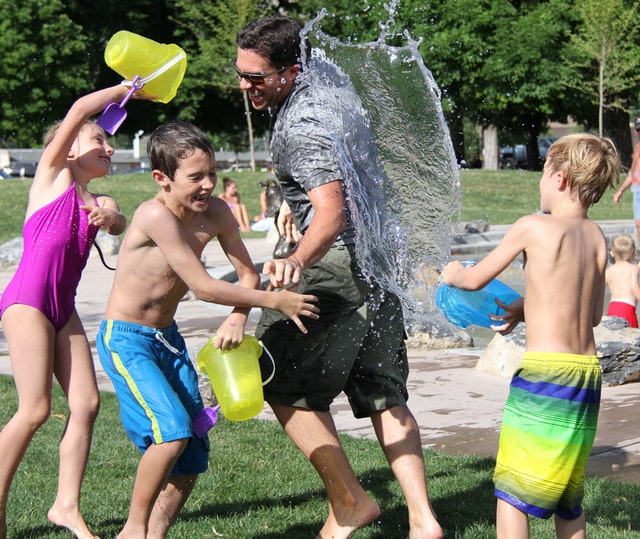
02 Jul Let’s play! How to Use Play to Teach your Younger Child Life Lessons and Values
Have you ever noticed how free children are with their laughter? Or with their openness to acting silly? As we age, we get bogged down with cultural expectations, responsibilities, and life’s pains, and along the way we somehow lose our ability to be free, and most importantly, to play. Play and laughter are not only crucial in creating a well-balanced life, but play is also a requirement for a child’s developmental growth. Here you will find some information and ideas for teaching your children through play. Ready, set, go!
Communication
How do we teach effective communication to our children? Talk with them! Whether you have an infant, or a 7 year old going on 17, children learn and grow by engaging with other humans. They will repeat what we say- so feed them positive self-talk! You can also teach them manners by role-modeling your “please,” and “thank you’s.” Here are some extra ideas as well:
- Pretend play- Imagine you are traveling the world, going to a restaurant, or hunting for treasure together. Any game that will stimulate conversation will help your child grow
- Mirror play- Have your child stand in front of the mirror with you, and have them repeat positive self-affirmations (here’s a YouTube video for inspiration)
- Read- The more words a child hears, the larger their vocabulary. That’s why it is never too early to start talking to your baby
Gross Motor
Gross motor “refers to moving the whole body and using larger muscles, such as those in the arms and legs.” This area of development is important for our overall health. The mind-body connection is strong, and having a healthy body can aid us in having a healthy mind. We can teach our children physical health, as well as helping them build the skills of taking calculated risks, trying something new, playing safely, and many other life skills. Of course, let’s teach children gross motor skills through play!
- Play a game of tag, skip, dance, bike, just move
- Go to a playground, or create your own obstacle course at home
- Encourage your child to join a local sports team
Fine Motor
Fine motor skills “refers to use of the small muscles found in individual body parts, especially those in the hands and feet.” These skills we tend to learn naturally, by learning how to feed ourselves, dress ourselves, and participate in other essential daily living activities. However, there are ways we can boost our child’s growth in these areas. By participating in the following activities together, your child gains fine-motor skills, gains exposure to sensory experiences, and gains extra time with you:
- Finger paint, color, and make crafts together
- Learn an instrument
- Eat finger foods
Social-Emotional
Social-emotional skills are learned from the day we are born. When you smile back at your smiling infant, or when you tell your crying toddler, “I’m here for you,” you are providing a space of warmth, safety, and positive social-emotional health. Children learn social-emotional skills throughout their daily activities, but we can provide intentional learning opportunities through the following activities:
- Board games- children can learn all about how to get along with others during this type of structured play
- Charades- this game is all about body language, facial expressions, and non-verbal communication
- Listen to a guided meditation together. You’ll both learn emotion regulation skills
Cognitive
As you’ve probably heard, children are like sponges, soaking up everything around them. We can give them an early start at succeeding in school and in life by supporting their cognitive development. We can do this by teaching them early on the ability to problem-solve, think critically, and practice mental flexibility. Use the following activities to support these skills:
- Puzzles
- Legos
- Word-searches
As you can see, there are lots of overlapping skills gained from each activity. Most importantly, engage with your child. Put down the electronics, look each other in the eye, and have some fun. You won’t regret the time well spent!
If you would like extra guidance and support on your parenting journey, please reach out to North Shore Family Services. We are happy to help you and your family reach your goals!

North Shore Family Services is a team of skilled and approachable therapists that help parents, children, teens, adults, and couples reduce anxiety and stress, learn effective problem-solving techniques, and manage emotions and behaviors that inhibit personal, school, family, and relationship success. We make therapy a productive, engaging and relaxing place for everyone to work hard and make the improvements they desire. To find the right-fit therapist for you and your family, visit our clinician’s page.



Sorry, the comment form is closed at this time.